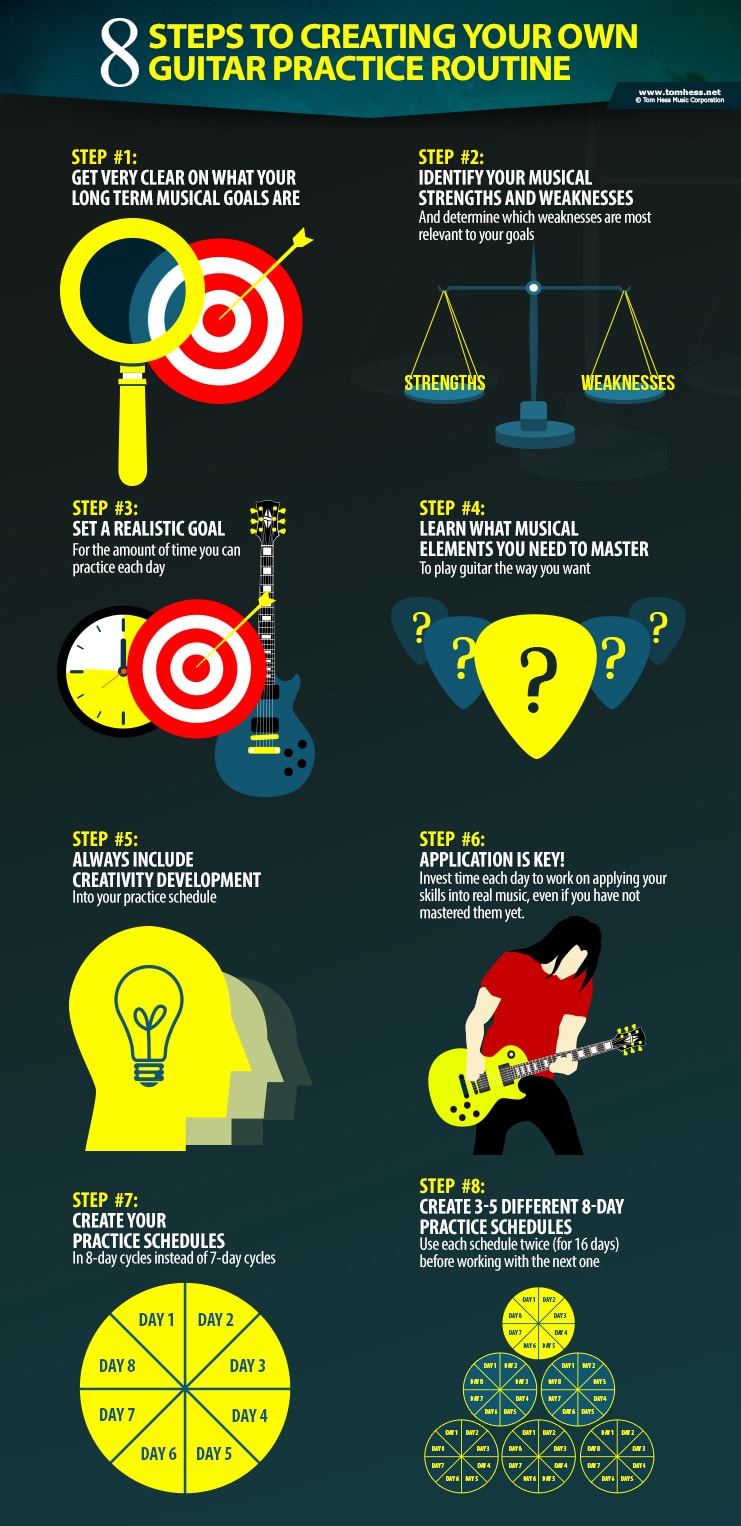Guitar Practice Advice: How To Become A Great Guitar Player Faster Without Practicing For Hours On End Every Day
by Tom Hess
Tons of guitar players believe that becoming great means practicing many hours per day, every day, for years and years…
However:
It’s certainly possible to practice as little as 30 minutes a day (or even less) and still become great IF you practice effectively & efficiently.
This makes practicing guitar feel like less of a chore so it feels fun – as it should!
Follow these simple steps to achieve your guitar playing goals faster by practicing less and getting better results from your practice time:
Step 1: Identify Your Guitar Playing Goals
This sets the foundation for your guitar playing progress. Every guitar practice session should be centered around your goals.
Sit down and clearly identify your short and long term goals using tangible and measurable metrics so you know when you are or aren’t making progress.
Set a clear deadline for your goals, so you stay on track.
For example:
Stay away from general goals that don't really help you understand clearly when you are improving, such as “I want to improve a lot.” Instead, set specific goals like “I want to be able to play X guitar licks at Y tempo 10 times in a row without making any mistakes within 2 weeks.”
Step 2: Arrange A Guitar Practice Schedule
Using a schedule for guitar practice keeps you on track so you don't waste time or take longer than desired to reach your guitar playing goals.
Tip: Do not spend equal time on all guitar practice items. Prioritize your time based on which items/skills are the most important for achieving your ultimate goals.
Read more ways to improve your guitar practice in the image below:

Step 3: Track & Measure The Results Of Your Practice Every Week
Tracking and measuring your progress helps you understand when your practice is effective and when it’s time to use a new approach.
Here’s an example of how to do this:
Choose any guitar practice item and record yourself playing it using your phone, computer or recording software of any kind.
Track specifically which mistakes you made within the item.
Then track how long you can continuously repeat the exercise without making a mistake. This helps you understand how consistently you can play it clean.
This gives you an idea of what percentage of the item is mastered so you can track this and measure it.
Step 4: Practice With Efficiency To Save Time
What is one way to save yourself tons of time, get faster results and practice with more focus?
Answer:
Practice exercises, techniques or items that have a strong overlap with one another.
For example:
Practicing tapping licks helps you improve less overall skills than practicing something like 3-note-per string scales using directional picking.
Keep this in mind while you practice in order to find the skills you can practice to get the most results from the least amount of practice time.
Now you know why you don't need to practice guitar for many hours a day to become a great player. This same concept applies to other areas of guitar playing as well.
For example: Becoming better at lead guitar doesn’t require memorizing as many scales or arpeggio patterns as possible. Instead, it’s all about how you use what you know.
Learn an easy and expressive way to improve your lead guitar playing using whatever skills you already have in this article about polymeter guitar licks.
 About Tom Hess: Tom Hess is a guitar teacher, music career mentor and guitar teacher trainer. He teaches rock guitar lessons online to students from all over the world and conducts instructional live guitar training events attended by musicians from over 50 countries.
About Tom Hess: Tom Hess is a guitar teacher, music career mentor and guitar teacher trainer. He teaches rock guitar lessons online to students from all over the world and conducts instructional live guitar training events attended by musicians from over 50 countries.

